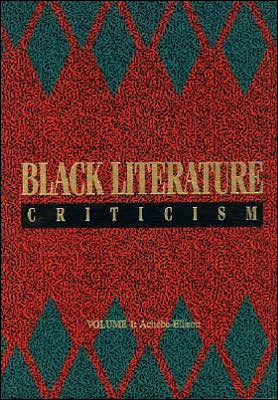

 |

|

The average rating for Black literature criticism based on 2 reviews is 3 stars.
Review # 1 was written on 2012-03-13 00:00:00 Mike Proske Mike ProskeMy friend got me this from a used book store for my birthday last year. It is really what got me started on my recent reading. The book is about black writing going from slave narratives to Elison and Wright. What hit me hardest at first was reading up close what southern slavery was like and how it was justified by southerners and southern preachers. Reading about all the myths and false narratives spun about black people to justify enslavement and how the black slaves had to engage actively in deception to stay alive (largely pretending to be loyal and faithful for better survival). That is what "masking" is. In the second part of the book he takes up Harlem renascence writers--Chesnut, Johnson, Thurman, Larsen, and Toomer. I took a long break between part 1 and two and read some of their works and read about the Harlem renascence as well as about the civil war, etc. These writers wrote a lot about "passing" when blacks look white and so secretly make a break from their past and join into white society. Here is an example of the striking nature of Petesch's writing about American Society and Moralism: "Moralism runs like a taproot through the American public posture over the centuries. [Petesch gives examples from history of how religion is deeply interwoven with politics in America]--"religion must be invoked--in absence of precedents and in response to both metaphysical vagueness and the multiplicity of metaphysical claimants--to justify American actions. This justifying did not stop at the plantation gate ... the general position of the slaveholder regarding the soul of his slave was, in its articulated form, some variation of the following: God had created blacks to be servants to whites, and the slaves had benefited morally from this role in which God had placed them. They had been removed from Africa, which was a moral sink: uncivilized, savage, brutish, licentious. They had been placed within a paternalistic institution, not unlike a family, where their physical wants were secure, their uncivil nature was civilized (or at least held in check), and they were exposed to the blessings of religion." He then quotes form the South Carolina and Mississippi slave catechism - Who gave you a master and mistriss? God gave them to me; Who says you must obey them? God says I must; and on and on, the Mississippi one quotes the bible to justify obedience as to Christ (referring to servants and masters). And slaves were often forced to go to church to hear such messages--Victoria McMullen said her grandmother in Arkansas was punished for not going but still refused saying "No, I don't want to hear the same old sermon--Stay out of your missus' and master's henhouse. Don't steal your missus' and master's chickens..." So when runnaway slaves began to write they pointed out the moral hypocrisy and bancruptcy of the master class -- "I love the pure, peaceable, and impartial Christianity of Christ; I therefore hate the corrupt, slaveholding, women-whipping, cradle-plundering, partial and hypocritical Christianity of this land. Indeed, I can see no reason, but the most deceitful one, for calling the religion of this land Christianity...We have men-stealers for ministers, women whippers for missionaries, and cradle-plunderers for church members. The man who wields the blood-clotted cousin during the week fills the pulpit on Sunday, and claims to be a minister of the meek and lowly Jesus. [John Thompson goes on and the whole thing is worth finding and reading]. It is also really helpful to see how Old Testament passages look from the perspective of the slave (David and Goliath, Samson, etc) But then Petesch takes us back even further saying that much of what black writers are doing is exposing the gap between the national promise and the national reality--even back to the Revolutionary War. "The slave was courted by the British during the hostilities; at the same time, he was often promised freedom by a hard-pressed Colonial government if he would but take up arms. Free blacks, on the other hand, were made to feel that their support would open up more opportunities; these 'promises' served as the basis for later petitions. The ideals were expressed in such phrases as 'No taxation without representation' and 'Give me liberty or give me death.' Freedom was continually stressed, both freedom from and freedom to: freedom from taxation, from quartering of troops, from search and seizure; and freedom to pass laws for the public good, to develop native industries, to administer justice. The expressions of ideals were not lost upon blacks, who, through committees and petitions, sought redress of their grievances, often in the very language of colonists/Revolutionaries. ...Thus blacks, over the centuries, have been in the ironic position of hearing about the 'city of God' but living in the city of man, of being exposed to national ideals but subjected to national reality. They worked in the nation's drawing room but lived in the country's kitchen. Little wonder their view from backstage has portrayed a different America." |
Review # 2 was written on 2016-09-04 00:00:00 Rickie Scott Rickie ScottThis would be an excellent resource for a scholar researching slavery and abolition in the 18th century because it contains verbatim writings of some literate blacks about their lives before, during and after they were enslaved, as well as some poems. Apparently, much of the writing was used to convince people to support abolition, so it's very dramatic and pious which makes it hard to wade through. The only parts I really enjoyed were the biographical sketches in the appendix. |
CAN'T FIND WHAT YOU'RE LOOKING FOR? CLICK HERE!!!